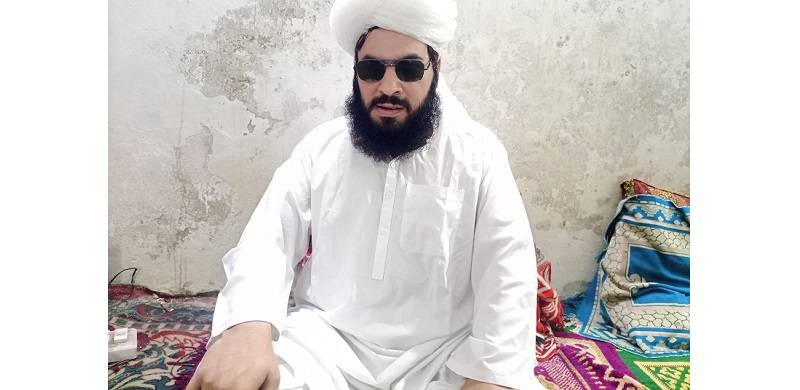
Mufti Abdul Haleem is blind from birth but his thirst for knowledge enabled him to become a religious scholar well versed in the Holy Quran, Ahadith, Fiqh, logic, English, Arabic and philosophy. He is also a teacher of hundreds of students.
Belonging to district Nowshera, the Mufti never went to school and completed all his education in a Madrassah (religious school). Starting from the basic level, he completed memorising the Quran in his village and later came to Peshawar. Here, at Namak Mandi's Darul Qura seminary, he switched over to the knowledge of Fiqh and Hadith along with other subjects.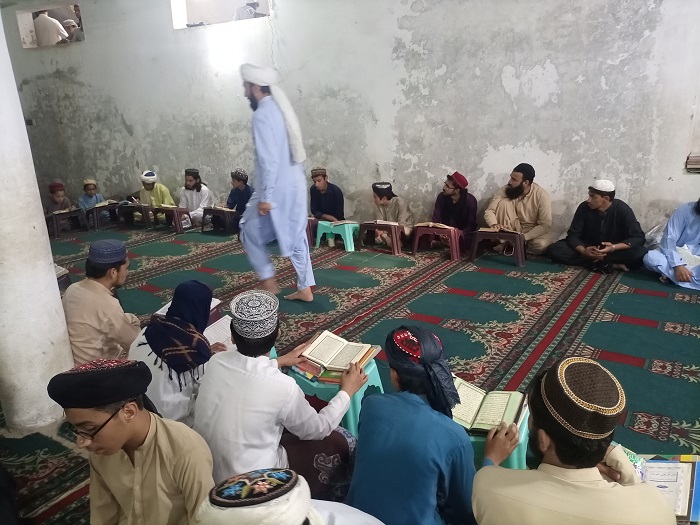
With this eight-year basic training in Fiqh and Hadith completed, he then took admission in a specialisation programme called a ‘Mufti course’ which is equivalent to an M.Phil degree. He is now busy in a research project for his Mufti course, which is near its completion. Soon after completing his education, Mufti Abdul Haleem Nizami has started his own seminary in the Achini area on the Ring Road, Peshawar. In this seminary, the students have started their study in four disciplines of Quran and Ahadith.
The basic level is the study of Holy Quran versed by verse, and after learning its correct recitation, the students then starts Hifz (memorising the Quran). This level takes at least two years to complete, however some talented students complete it in one and a half. After completing Hifz Quran, the students starts revision which is called Tajwed.
The third discipline being thought in this Madrassah is Dars-i-Nizami in three classes. After Hifz Quran, some students start translation and tafsir (explanation) of the Holy Quran and some follow the line of Fiqh and Ahadith.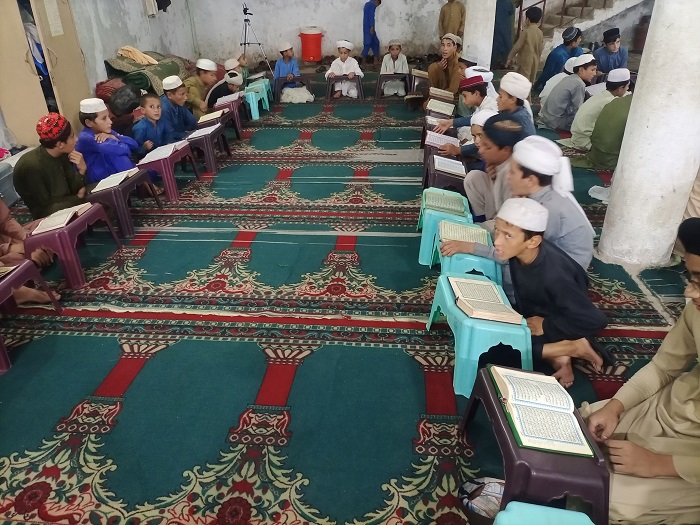
Despite limited resources and lacking eyesight, Maulana Abdul Haleem Nizam never gave up. He brings the same spirit to his struggle to impart a religious education to his scores of students.
The seminary itself is hardly a four- to five-Marla underground hall and accommodates 130 students. The teachers and students cooperate with each other due to meagre financial resources to learn the Quran and Hadith.
Narrating the story of his own education, Mufti Abdul Haleem says that he was blind from birth and his eyes lack a functioning retina. He says that when he started his education in his village seminary, his brother would bring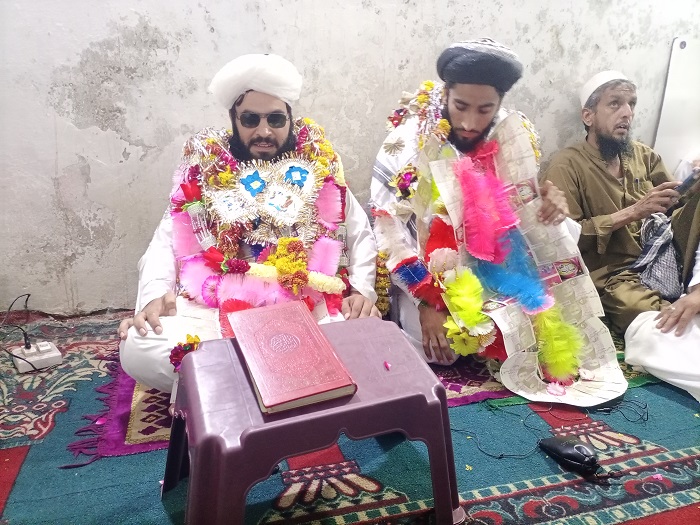 him there and wait to take him back home. He is still grateful to his older brother for making his education possible.
him there and wait to take him back home. He is still grateful to his older brother for making his education possible.
He says that today they are facing only one major challenge, which is the lack of space. They are looking to well-off people to support them in this cause. The Mufti estimates that a 10- to 12-marla area will cover their need to accommodate more students. This will not only cover their classes but would also be sufficient for the accommodation of students.
The Mufti is counting on the public’s great respect for religious education for this endeavour to succeed.
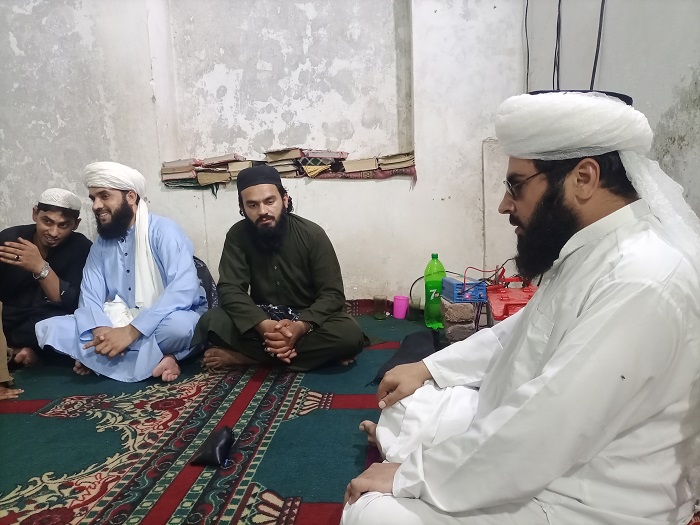
When asked regarding the salaries of teachers, he says that sometimes they are unable to pay their staff. But, he says, the teachers do not complain, as they see their teaching of the seminary students as a volunteer task.
“Teachers mostly belong to this area and they are interested to teach free of cost to these poor students, Mufti Abdul Haleem Nizami says. “If anyone wants to extend support for this seminary, they can contact us,” he adds.
Belonging to district Nowshera, the Mufti never went to school and completed all his education in a Madrassah (religious school). Starting from the basic level, he completed memorising the Quran in his village and later came to Peshawar. Here, at Namak Mandi's Darul Qura seminary, he switched over to the knowledge of Fiqh and Hadith along with other subjects.

With this eight-year basic training in Fiqh and Hadith completed, he then took admission in a specialisation programme called a ‘Mufti course’ which is equivalent to an M.Phil degree. He is now busy in a research project for his Mufti course, which is near its completion. Soon after completing his education, Mufti Abdul Haleem Nizami has started his own seminary in the Achini area on the Ring Road, Peshawar. In this seminary, the students have started their study in four disciplines of Quran and Ahadith.
The basic level is the study of Holy Quran versed by verse, and after learning its correct recitation, the students then starts Hifz (memorising the Quran). This level takes at least two years to complete, however some talented students complete it in one and a half. After completing Hifz Quran, the students starts revision which is called Tajwed.
The third discipline being thought in this Madrassah is Dars-i-Nizami in three classes. After Hifz Quran, some students start translation and tafsir (explanation) of the Holy Quran and some follow the line of Fiqh and Ahadith.

Despite limited resources and lacking eyesight, Maulana Abdul Haleem Nizam never gave up. He brings the same spirit to his struggle to impart a religious education to his scores of students.
The seminary itself is hardly a four- to five-Marla underground hall and accommodates 130 students. The teachers and students cooperate with each other due to meagre financial resources to learn the Quran and Hadith.
Narrating the story of his own education, Mufti Abdul Haleem says that he was blind from birth and his eyes lack a functioning retina. He says that when he started his education in his village seminary, his brother would bring
 him there and wait to take him back home. He is still grateful to his older brother for making his education possible.
him there and wait to take him back home. He is still grateful to his older brother for making his education possible.He says that today they are facing only one major challenge, which is the lack of space. They are looking to well-off people to support them in this cause. The Mufti estimates that a 10- to 12-marla area will cover their need to accommodate more students. This will not only cover their classes but would also be sufficient for the accommodation of students.
The Mufti is counting on the public’s great respect for religious education for this endeavour to succeed.

When asked regarding the salaries of teachers, he says that sometimes they are unable to pay their staff. But, he says, the teachers do not complain, as they see their teaching of the seminary students as a volunteer task.
“Teachers mostly belong to this area and they are interested to teach free of cost to these poor students, Mufti Abdul Haleem Nizami says. “If anyone wants to extend support for this seminary, they can contact us,” he adds.

